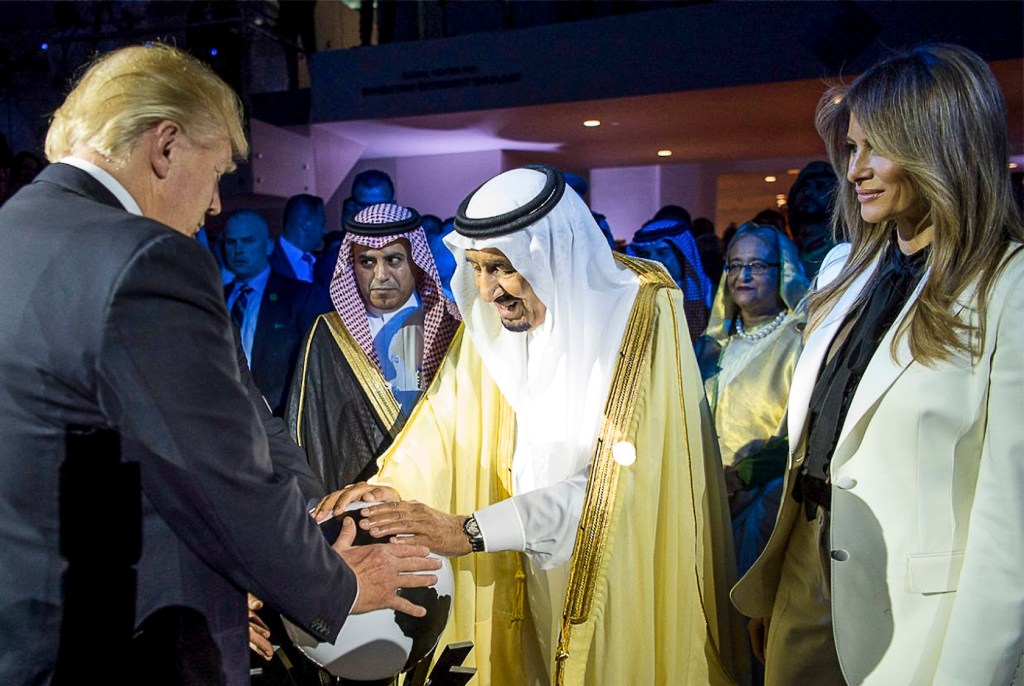Faculty experts reflect on Trump’s foreign trip

President Donald Trump recently returned from his first foreign trip as commander in chief, a nine-day tour including stops in Israel, Saudi Arabia, and the Vatican.
His aides praised the trip, calling it a historic success. “We’ve never seen before at this point in a presidency such sweeping reassurance of American interests and the inauguration of a foreign policy strategy designed to bring back the world from growing dangers and perpetual disasters brought on by years of failed leadership,” White House press secretary Sean Spicer said.
Others, including some former government officials, saw the trip as nothing more than “some firm handshakes, forced smiles, and awkward sword dances.”
We asked two faculty members—Valentine M. Moghadam, director of the International Affairs and Middle East Studies programs, and John Portz, interim chair of the Department of Political Science—to give their takes.
“To most observers,” the Chicago Tribune writes, “President Donald Trump’s first overseas trip was either a moderate success that was at times overshadowed by viral GIFs or a disaster that damaged the United States’ relationships with longtime European allies.” What’s your take on Trump’s first foreign trip? What were his biggest successes and failures?
Portz: I would rate it closer to moderate success than disaster. It’s ironic that he seemed to be more comfortable and engaged at the Arab summit than with long-standing European allies. Despite his campaign rhetoric and recent actions to limit immigration from Muslim countries, Trump was able to meet with Arab leaders and not inflame the situation further. The meeting with European allies was less successful and highlighted his challenge of connecting on a personal and diplomatic level with these leaders. The subsequent exit from the Paris climate accord will certainly make this relationship even more difficult.
“This is not a battle between different faiths, different sects, or different civilizations,” Trump said of the fight against terrorist groups during his keynote at the Arab-Islamic-American Summit in Saudi Arabia. “This is a battle between barbaric criminals who seek to obliterate human life and decent people of all religions who seek to protect it. This is a battle between good and evil.” How did you view his speech to leaders of more than 50 Muslim-majority countries? Do you think this rhetorical shift from the campaign trail, where he proposed a ban on all Muslims entering the U.S., will translate into strategic changes?
Moghadam: A correction is in order. President Trump’s executive ban was not directed against “all Muslims” but rather citizens of, and those arriving from, Iran, Iraq, Somalia, Sudan, Syria, and Yemen, although Iraq was later removed from the list. It was a targeted ban ostensibly aimed at keeping out potential terrorists—although countries that have produced numerous terrorists and jihadists, including U.S. allies Saudi Arabia and Pakistan, were not on the list.
Regarding President Trump’s speech decrying Islamist extremism: I found it thoughtful and sincere. But will it change the spread of Islamist extremism? I doubt it will do so in the foreseeable future.The speech came far too long after all the damage was already done, in no small measure because of the fallout from U.S. policies of anti-communism (support for the Afghan Mujahideen in the 1980s) and regime change (the 2003 invasion of Iraq, the 2011 NATO bombardment of Libya to dislodge Muammar Gadhafi, and a six-year campaign of support for anti-Assad rebels in Syria). These policies—backed by U.S. allies in Europe, the Gulf sheikhdoms, and Pakistan—created political vacuums that were filled by “radical Islamic jihadism.”
The speech probably fell on deaf ears in Riyadh, given the Saudi regime’s decades-long global sponsorship of Wahhabi-style Islamic fundamentalism and political Islam. Will Trump’s speech finally move Saudi Arabia to allow churches on its soil, considering that it finances the building of mosques all over the world? I rather doubt it.
It is important to establish the causes of the spread of “the barbaric criminals” because the countries responsible need to account for all the damage that has been done and because policies of regime change, destabilization, and militarism have to end once and for all. Initially, I had some hope that the Trump administration would break that cycle, but the military deal with Saudi Arabia proved otherwise. When will the U.S. stop selling weapons to undemocratic and aggressive countries? When will the U.S. use its leverage with Israel to end the building of settlements and to conclude a peace agreement with the Palestinians? When will the U.S. stop its hostility toward Iran and display true global leadership by mobilizing regional cooperation to end violent extremism?
As part of his first foreign trip, Trump refused to endorse NATO’s doctrine of collective defense at a meeting in Belgium and then declined to support the Paris climate accord at the G7 summit in Italy. A few days later, he pulled the U.S. from the Paris climate agreement. What are the pros and cons of Trump’s “American First” approach?
Moghadam: Pulling the U.S. out of the Paris climate accord will likely damage what is left of U.S. global leadership. I support the science on global warming and am convinced that we need coordinated global efforts to stop and possibly reverse the harm already done to our Earth. This is not in contradiction to an “America First” strategy, because investments could be made in the production of renewables as opposed to coal mining and fracking. Indeed, an America First strategy should include the creation of good jobs for Americans through public-private investments in environmentally-friendly infrastructural improvements, affordable housing, and the expansion of pre-schools. Rather than reject the world’s concerns over climate change and the adverse effects of endless economic growth, the U.S. should be a leader in sustainable development and should meet its moral obligations to reduce carbon emissions as called for by the Paris climate accord.
Portz: “America First” continues to be Trump’s electoral strategy—and there is certainly a constituency for it. Time—and another election—will tell how successful it will be. It is, however, redefining America’s position in foreign policy and global relations. Some might see this in a positive light, but America’s role as a world leader is taking a hit. By withdrawing from the Paris agreement, Trump has made it more difficult for our own diplomats to sit at the table for climate change discussions and is likely to spill over into other policy areas. A pattern is emerging with Trump in which he moves away from multilateral diplomacy and turns to a country-to-country strategy. Just as he did in the business world of building a real estate empire, he wants to “sit at the table,” country by country, to get the best deal he can. There are times when that might work, but the increasingly multilateral nature of international relations points in a different direction.





